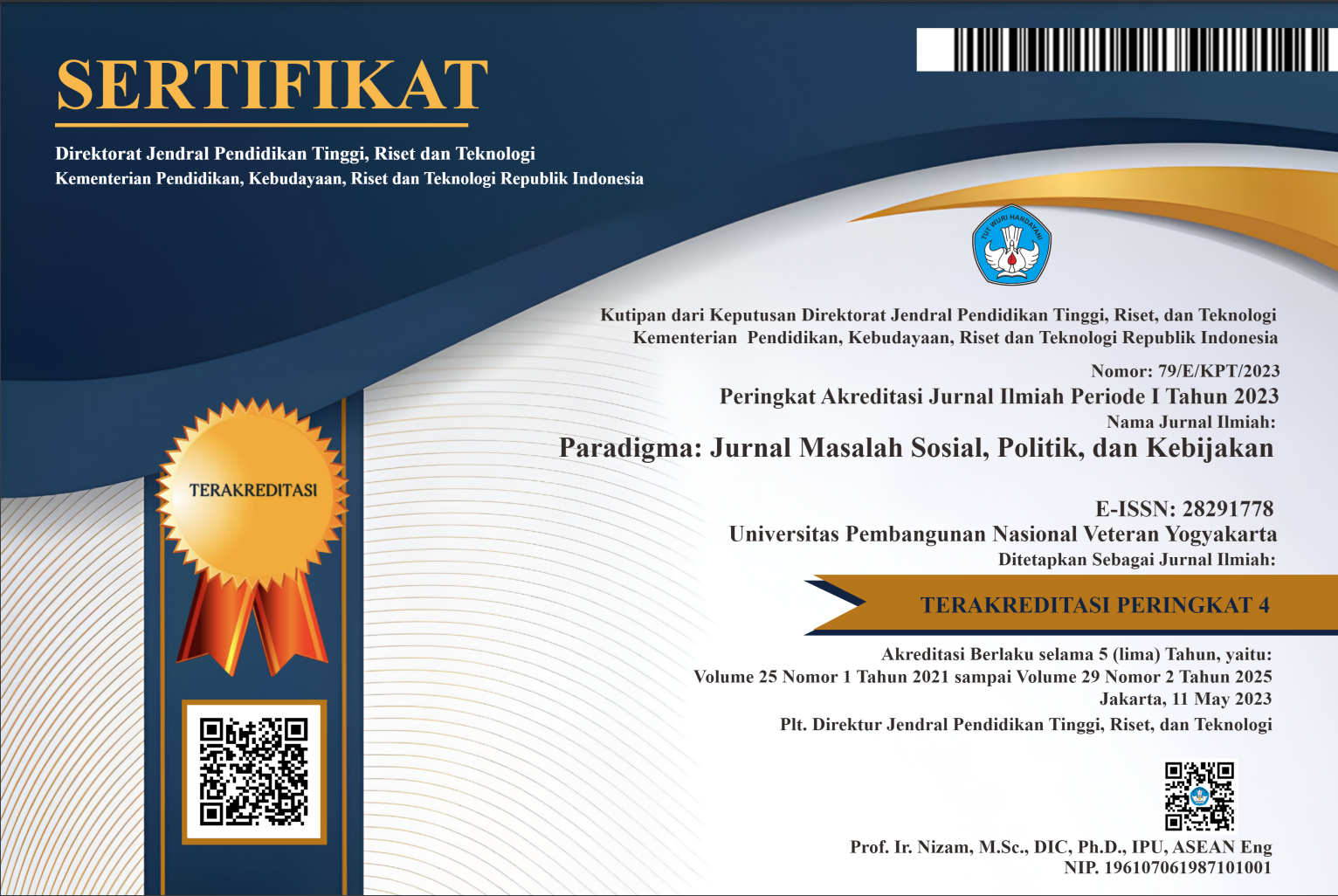Understanding The Human Rights Discrimination of South Korea Muslims
Abstract
This research analyzes discrimination against Muslims in South Korea, a country known to be advanced in terms of technology and economy. Various factors influence this discrimination, including anti-Islam propaganda, lack of understanding about Islam, and incidents of religious-based terrorism in the world. In the last few years, namely 2018-2023, human rights discrimination against the Muslim community in South Korea has become a public concern. In South Korea, discrimination against Muslims leads to human rights violations and hatred. The complexity of this problem is further strengthened by the interaction of various factors, social changes, and the dynamics of life in South Korea. This research uses a qualitative approach and case studies to understand this phenomenon from the perspective of perpetrators and victims of discrimination, involving local South Korean residents and Muslims living in South Korea. The results of the research show that there is a significant influence from various parties which influences the occurrence of direct and indirect acts of human rights discrimination against Muslims in South Korea, impacting the human rights of Muslims living in South Korea.
Keywords : Discrimination, Muslims in South Korea, Human Rights.
Keywords
Full Text:
PDFReferences
Anggraeni, A. (2023). Masuknya Pengungsi Yaman ke Korea Selatan pada Tahun 2018. Journal Jom Fisip , 5.
Board, B. H. (2018). Retrieved February 19, 2024, from https://www1.president.go.kr/petitions/269548
Byung, C. (2010). Islamic Studies in Korea. International Area Studies Review, 3-21.
Center, K. C. (2015). Retrieved January 26, 2024, from https://id.korean-culture.org/id/139/korea/39
Christie, N. (2023). Retrieved February 24, 2024, from https://www.mantappu.com/2023/06/18/realita-merantau-tantangan/.
Darynaufal, A. D. (2022). Islamofobia di Indo-Pasifik: Akar Permasalahan, Dampak Terhadap Keamanan dan Strategi Penanggulangan. Jakarta: Uki Press.
Detik.com. (2019). Retrieved February 10, 2024, from https://news.detik.com/internasional/d-4470643/faktaterkini-aksi-brutal-penembakan-di-masjid-new-zealand
Firdaus, M. (2011). Islamophobia Agenda Ideologi Barat Melucuti Aqidah Islam dari Umat dan Dunia . Bandung: Rosdakarya.
Freedman, S. (2005). Discrimination and Human Right . England: Oxford University Press.
Gholami, R. (2021). Critical Race Theory and Islamophobia: Challenging Inequity in Higher Education. Journal Race Ethnicity and Education, 319-337.
Golder , M. (2018). Far Right Parties in Europe. Journal Annual Review of Political Science, 478-480.
Joy, N. a. (2021). Retrieved February 19, 2024, from http://www.newsnjoy.or.kr/com/com-1.html.
Jung, E. (2017). The Impact of Majority Identity on the Formation of Minority Identity: The case of Muslim in South Korea. Journal of Muslim Societies, 1-5.
Jungyun Kim, K. (2012). The formation of the South Korean identity through national curriculum in the South Korean historical context: Conflict and Challenges. International Journal of Educational Development, 797-804.
Junseok, K. (2021). Islamophobia in South Korea: The Impact of Terrorism and Refugees. Asian Journal of Comparative Politic, 117-125.
Kim, E.-H. (2019). Muslim in South Korea: From Stranger to Newcomers. Inggris: Routledge Inggris.
Koo, G. Y. (2018). Islamophobia and the Politic of Representation of Islam in Korea. Journal of Korean Religions, 159-192.
Korea, B. S. (2023). Retrieved November 6, 2023, from https://kostat.go.kr/menu.es?mid=a20303020000.
Kwon, J. (2019). Retrieved February 10, 2024, from https://www.mei.edu/publications/south-koreas-yemeni-refugee-problem.
Lee, K. (2021). Retrieved February 24, 2024, from http://dx.doi.org/10.33526/EJKS.20212101.291.
Mcgowan, R. B. (2004). Muslim in the Diaspora. London: University of Toronto Press.
Pratama, A. (2023). Retrieved from https://www.kompasiana.com/malifpratama9507/6400c3fdcf40871c7f01ff05/mengapa-rasisme-di-korea-selatan-sangatlah-tinggi-padahal-sesama-negara-asia?page=all#section1
Ropi, I. (2018). Retrieved February 11, 2024, from https://repository.uinjkt.ac.id/dspace/bitstream/123456789/41762/1/Ismatu%20Ropi%20Terorisme%20Sebuah%20Persoalan%20Defini%20%28Memahami%20Terorisme%20Sejarah%2C%20Konsep%20dan%20Model%29.pdf
Sahni, A. (2011). The Routledge Handbook of Terrorism Research (edisi Revisi). New York: Routledge.
Sajid, A. (2019). Islamophobia and the Making of Muslim Identities in Europe. Jornal Ethnic and Racial Studies, 103-120.
Sang, Y. (2018). Retrieved February 25, 2024, from https://cafe. naver.com/shopjirmsin/2721790
Sasongko, A. (2015). Retrieved March 12, 2024, from https://khazanah.republika.co.id/berita/nodtx3/universitas-di-korea-sediakan-mushala-dan-makanan-halal.
Sayyid. (2014). A Measure of Islamophobia. Islamophobia Studies Journal, 10-25.
Schmid, A. P. (2012). The Routledge Handbook of Terrorism Research. New York: Routledge.
Sheikh, F. (2019). Exploring Korean Islam in Climate of Exclusion and Islamophobia. Journal International of Diaspora& Cultural Critictism, 197-204.
Sin, Y. W., & Ma Dong Hoon. (2019). Two Faces of Yemen Refugee Represented in South Korean Media : A Critical Discourse Analysis of Chosun Ilbo and Hankyoreh. Korean Citation Index, 32-33.
Terkinni.com. (2022). Retrieved March 12, 2024, from https://terkinni.com/2022/01/07/prince-sultan-islamic-school-sekolah-islam-di-korea-selatan/
Thomas Luckmann, P. (1996). The Contruction of Social Reality . New York: Anchor Book.
Wendt, A. (1995). Towards an Understanding of Social Contructivism. Journal of Contructivist Psychology, 65-84.
Wicaksana, G. W. (2018). Teori Hubungan Internasional (edisi Revisi). Surabaya: Airlangga University Press.
Yu, S. (2018). Retrieved February 19, 2024, from https://news.joins.com/article/22860819
DOI: https://doi.org/10.31315/paradigma.v28i2.12272
Refbacks
- There are currently no refbacks.
Copyright (c) 2024 Nur Sakinah, Erna Kurniawati

This work is licensed under a Creative Commons Attribution-ShareAlike 4.0 International License.
Paradigma: Jurnal Masalah Sosial, Politik, dan Kebijakan
Published by Faculty of Social Science and Political Science
Universitas Pembangunan Nasional "Veteran" Yogyakarta
(Kampus Unit II) Jl. Babarsari 2, Tambakbayan, Depok, Yogyakarta 55281
Phone: +62 274 486733. Email: paradigma@upnyk.ac.id

This work is licensed under a Creative Commons Attribution-ShareAlike 4.0 International License.


